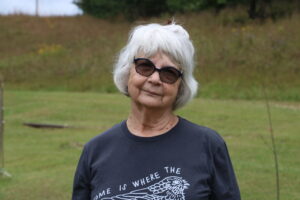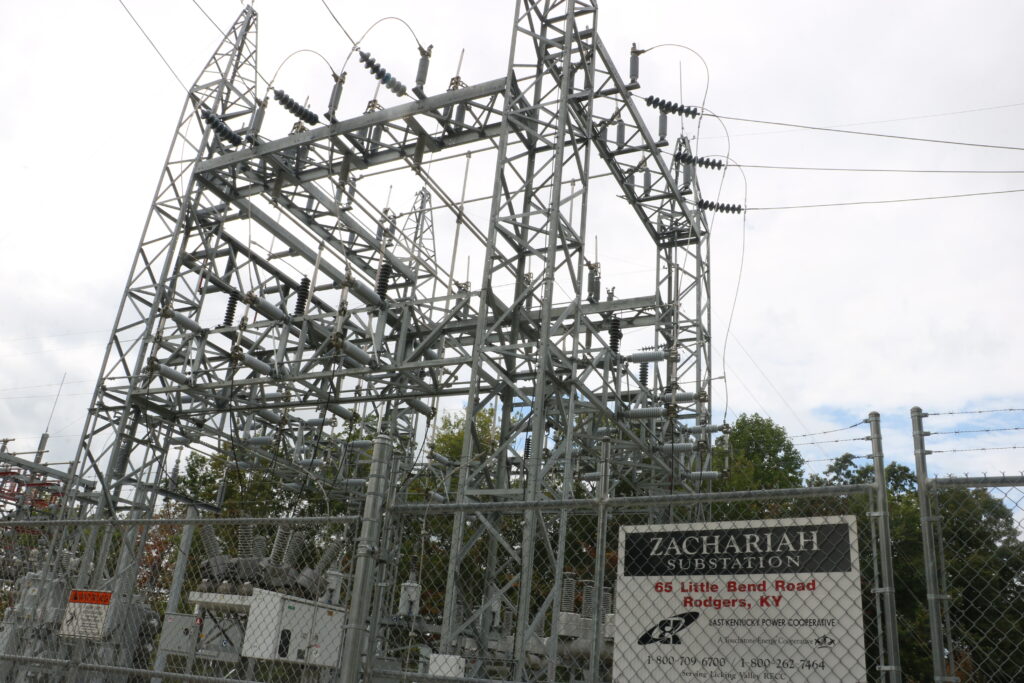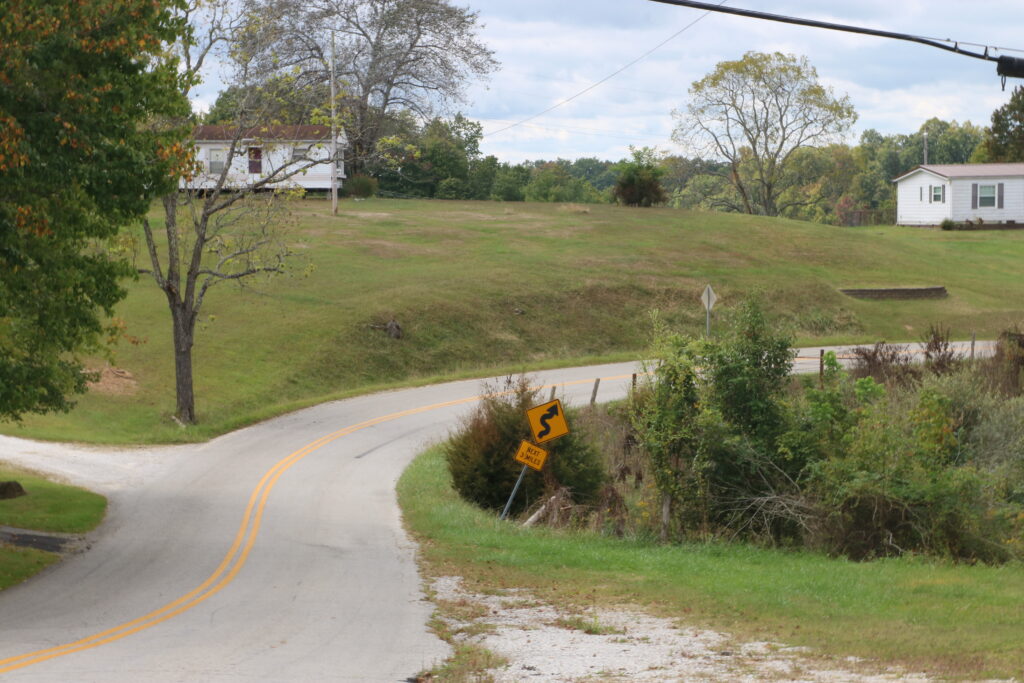Nine months after a suspected cryptocurrency mine moved into her previously quiet part of Wolfe County, Brenda Campbell says noise canceling blankets installed by the operator are not helping and she still doesn’t know where to turn for relief from the constant, intrusive whirring.

Wolfe County Judge-Executive Raymond Banks agrees the noise blankets haven’t been very effective, though he said the data center company told him the noise levels are so low it wasn’t necessary to “even have to put what they put up there.”
“I think the sound will always be there regardless of what they do,” Banks recently told the Lantern.
Campbell and Banks are looking to Frankfort for answers and point to recent action by Arkansas lawmakers as a possible roadmap.
Spurred by rural communities’ complaints about noise and disruption, Arkansas lawmakers passed and Gov. Sarah Huckabee Sanders signed legislation this month requiring cryptocurrency mining operations to obtain state permits and when they operate near homes to implement “noise-reduction” techniques. The new law also bans some foreign governments, most notably China, from owning a cryptocurrency mining operation in Arkansas and restores authority to local governments to pass regulations related to cryptocurrency mines.
To do this, the Arkansas legislature had to reverse a law that it had passed just last year, in part at the urging of a pro-crypto lobbying group, the Satoshi Action Fund. The earlier law had limited local governments’ authority to regulate noise from the facilities.
Earlier this year, the Satoshi Action Fund lobbied the Kentucky legislature to pass House Bill 741, which was approved by the House but died in the Senate.
Rural counties without zoning most vulnerable
Crypto mining uses tremendous amounts of electricity to run high-powered computers that solve complex mathematical equations to secure online transactions of cryptocurrencies through a digital ledger called the “blockchain.” Mining companies that, for example, solve these equations for the cryptocurrency Bitcoin are rewarded with Bitcoin itself; one unit in Bitcoin was worth more than $60,000 earlier this month.
Electric fans used to cool the computers can generate a lot of sound.

The Kentucky sponsor of the industry-sought bill, Rep. Adam Bowling, R-Middlesboro, said the legislation would steer noisy, large-scale cryptocurrency mining operations to industrial parks and other designated places for industry.
But others said the bill would leave the many rural Kentucky counties that have no zoning laws without protection or recourse from crypto mining noise.
As recently as 2020 a little more than half of Kentucky counties had no planning and zoning offices or boards, according to a presentation that year by the Kentucky Association of Counties. Wolfe County is one of them.
Bowling appeared before a legislative committee on March 13 with representatives from Satoshi Action Fund and Kentucky Blockchain Council, both groups supporting the bill.
Bowling told the Lantern that some local governments are reactively trying to “change the rules and kind of patch it together” once cryptocurrency mining operations are already established and that the bill would put regulations in place before operations move into a community.
“They want to get the rules and the regulations set out on the front end before they make multimillion dollar investments and then things are changed after the fact,” Bowling said.
An environmental group expressed concerns at the time that the bill would still allow for intrusive noise pollution from mining operations. Audrey Ernstberger, a lobbyist with the Kentucky Resources Council, told members of the House Banking and Insurance Committee in March that the bill “would selectively override the ability of local communities” to reasonably regulate off-site noise impacts from asset mining operations.
Ernstberger said the bill would have held crypto mines to the community’s most “lenient” noise regulations, instead of a more protective standard, and set no specific noise level parameters.
The bill cleared the Kentucky House with Republican support in a largely party line vote, but upon reaching the Senate was never assigned a committee.
In an interview with the Lantern, Ernstberger said the bill would have blocked communities from implementing more stringent noise or zoning regulations after a cryptocurrency mining operation has moved in. The bill provides no conditions for operating cryptocurrency mining facilities in a county without noise or zoning laws, which Ernstberger said could allow facilities to establish themselves anywhere without zoning.
Eric Peterson, the director of policy for the Satoshi Action Fund, in response to a question from a lawmaker at the committee hearing, said the group doesn’t want large-scale mining operations to set up “next to our house, next to a school, next to a church.”
“Businesses in industrial zones, they create noise, they use a lot of energy. That’s where we want these things,” Peterson said.
The Satoshi Action Fund didn’t respond to emails requesting an interview about their advocacy on HB 741.

‘Just really no business like it’
In Arkansas, one of the new law’s sponsors, Republican state Sen. Missy Irvin, said the measure will provide “great legal standing” for those opposing nuisance cryptocurrency mines, referencing a legal battle between residents of an Arkansas community and a crypto mine.
Another Arkansas Republican, Sen. Bryan King, of Green Forest, wanted the legislature to go even further by providing communities more notice of where crypto companies plan to mine. King unsuccessfully tried to require mining companies to file a notice with the state six months before buying or leasing land.

King doesn’t see zoning, which local governments traditionally use to decide where industry and business can locate, as a solution, in part because rural communities like those he represents do not want zoning. He also points to the unique nature of crypto mining.
“There’s just really no business like it,” King told the Lantern. “You may have a mill or industry that may emit noise from 8 to 5, but not 24-7, 365 (days a year).”
‘Just one day it’s there’
In Kentucky, Banks, the Wolfe County judge-executive, remains firmly opposed to zoning or a noise ordinance, fearing such laws could hamper future economic development in a county where many struggle with poverty.
But Banks told the Lantern he wishes the county had received some notice that Artemis Power Tech’s data center was moving into his county before it powered up.
“We’re clueless — just one day, it’s there. Nobody ever mentioned it to me,” he said.
“I don’t have the answer to it. If I had known the thing was going in before it went in, I could have maybe have done some kind of ordinance to stop it.”

Campbell and her neighbors, which include her daughter, grandson and cousins, are still bothered by the high-pitched noise from the data center that set up shop next to an electrical substation in August 2023. Her efforts to curb the noise haven’t gained traction.
An Artemis Power Tech representative in an email said the company in January installed “noise canceling blankets” after a “third-party construction site noise control assessment” and “have heard no further complaints since then.”
The representative added the company is “willing to take reasonable measures through open communication to ensure we are a long-term trusted partner here.”
But Campbell said the blankets “have not helped at all.” She says the noise seems worse on days when the weather is warmer because the cooling fans run harder.
The Artemis Power Tech representative told the Lantern it decided to install noise blankets instead of a physical noise barrier because building such a barrier would require trees to be cut down and “reduce noise absorption effectiveness.”
Banks had told the Lantern in October the noise issue would be fixed with the company promising to install a “noise barrier.”
Campbell said that what started as her concerns about noise have expanded to broader worries about regulation of the cryptocurrency industry as a whole — who owns and runs cryptocurrency mining operations, how cryptocurrency is being used and more.
“I just feel like that somebody has dropped the ball and that they’re just not paying attention,” Campbell said. “It just seems like the whole situation is being ignored, not only at the local level but also, you know, at the state and national level.”
She applauds what Arkansas is doing to protect local communities.
“They changed their mind that something needed to be done,” Campbell said.
Lane Boldman, executive director of the Kentucky Conservation Committee, a statewide environmental advocacy group, said Campbell’s situation is an example of a crypto mining operation taking advantage of a rural county’s lack of zoning.
Boldman noted that solar energy projects must promise to mitigate excessive construction noise as part of a hearing before the Kentucky Public Service Commission.
Cryptocurrency mining operations don’t have any similar process to mitigate local impacts, she said..
“They probably cause just as much noise, if not worse noise in some ways, because it doesn’t stop,” Boldman said.








